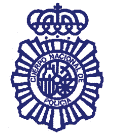General Commissariat of Intelligence
Comisaría General de Información
 The National Police Corps had a General Commissariat of Intelligence, with an antiterrorist mission that included a Foreign Intelligence Brigade to investigate international terrorism aimed against Spain. France and Spain continue to cooperate in bringing to justice members of the Basque Fatherland and Liberty (ETA) terrorist organization, while Spanish authorities have offered to negotiate with Basque groups that foreswear violence. Spanish authorities have arrested, tried, and jailed the leadership of the ETA's political wing, the Herri Batasuna.
The National Police Corps had a General Commissariat of Intelligence, with an antiterrorist mission that included a Foreign Intelligence Brigade to investigate international terrorism aimed against Spain. France and Spain continue to cooperate in bringing to justice members of the Basque Fatherland and Liberty (ETA) terrorist organization, while Spanish authorities have offered to negotiate with Basque groups that foreswear violence. Spanish authorities have arrested, tried, and jailed the leadership of the ETA's political wing, the Herri Batasuna.
The Aznar government, which came to power in May 1996, vowed to work diligently to neutralize ETA and has put special emphasis on strengthening cooperation with other states-particularly France-in this effort. In May 1996 press reports indicated that France planned to assign a police attache to its Embassy in Madrid to coordinate daily cooperation with Spain. Moreover, Madrid and Paris signed an agreement in June that allowed for the establishment of four joint police stations-three on the French side of the border. Meanwhile, Spain persuaded France to help reform a European extradition treaty in the European Union to allow "simple membership in an armed band" to be sufficient cause for extradition.
Despite numerous Spanish counterterrorism successes and increased international cooperation with France and Latin American countries, the Basque Fatherland and Liberty (ETA) terrorist group continues its campaign of murder, bombings, kidnappings, and street violence. ETA killed 13 persons in 1997, as compared to five during 1996. ETA's primary targets remain members of the Spanish security forces and judicial and prison officials, but the group has also stepped up attacks against local politicians belonging to the ruling Popular Party.
Madrid struck a blow against the Algerian Armed Islamic Group's (GIA) infrastructure in Spain with the arrest of suspected GIA member Farid Rezgui on 14 June 1996. Rezgui reportedly had some 30 sets of false Italian, French, Spanish, and Algerian identification documents in his possession, presumably for use by GIA members to facilitate their movements in Europe. Authorities reportedly also found magazines published by GIA and other Islamic extremist groups, as well as video and audiocassette tapes of speeches by Islamic leaders, including Shaykh Umar Abd al-Rahman, the spiritual leader of the Egyptian extremist al-Gama'at al-Islamiyya.
|
NEWSLETTER
|
| Join the GlobalSecurity.org mailing list |
|
|
|

